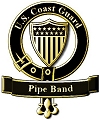 Drums Frequently Asked Questions
Drums Frequently Asked Questions
For additional FAQs and info, also see:
-- Pipes FAQs
-- Parts of the Bagpipe
-- FAQs
What percussion instruments are in a pipe band drum section?
In the modern pipe band, there are several percussion instruments. The main "voice" in the drum section is the snare drum. These are high-tension marching snare drums with Kevlar heads. Snare parts are written to compliment the bagpipe part of a tune. There are usually four to eight snare drummers per band, and one "lead drummer" that the rest watch to maintain focus and unison.
Additionally, there are tenor drums. These are tom-like drums that are tuned to a musical note. There are usually between one and four tenor drummers, and each player plays one drum. Usually there is more than one tenor drummer, and the drums are tuned in harmony with the others. The parts written for the tenors are meant to compliment the melody line of the pipes, as well as the rhythms of the snares. Some players only "flourish" (spin their sticks in visual patterns), some only play (known as rhythm tenors), and others do both. Rhythm tenors often play "split" parts, not unlike that of marching band bass lines. Often referred to as the "midsection", the warm tones of the tenor drums add fullness to the ensemble sound.
Last but not least, there is the bass drum. This is a very important role in the drum section. Playing the biggest and lowest-tuned drum, he is known as the "heartbeat of the band". There is usually only one bass drummer per band.; His job is to keep the beat and pulse for the drum section and the rest of the band. Typically, his parts are simpler, but are written to compliment the snares and midsection, as well as the overall ensemble.
I played drums in high school, but have not played in a long time. I want to learn, but do you think I can do it?
Yes. Many drummers who have taken a lot of "time off" from the instrument have a renewed interest later in life. This is often an advantage, as many adults have more focus and commitment than younger learners. Additionally, much of what many drummers learn can be applied to pipe band drumming, and there are many similarities. It is often easier to learn pipe band drumming if one has a background in drumming and natural talent and rhythm.
I have never played drums (or any other instrument) before. Can I still take lessons?
Absolutely. Many of our members started learning from "scratch" and have no prior musical background. In fact, many instructors prefer to teach those with no experience, since there are no bad habits to overcome. With the right determination, amount of practice, and qualified instruction, you can achieve your goals.
My son or daughter wants to learn. Is he/she too young?
The minimum age for learning to play depends on the individual child (as well as the instructor). Typically, the best age to start learning is about eight years old. This age is good because the child's hands are large enough to develop good technique, the child is a bit more focused, and the communication level is satisfactory for learning. Encourage a child that is interested in music, no matter what the age. When music is introduced as young as possible, studies show that this will help the child to learn better and develop more quickly in all aspects of life.
I am an adult. Am I too old to learn?
No. There is no "maximum" age to begin to take up the instrument. All that is required is a good attitude, determination and quality instruction.
What will I need to bring to my lesson?
Your instructor will let you know just what to bring to your first lesson. Generally, you will need a practice pad, pipe band drumsticks, and a required tutorial book.
U.S. Coast Guard Pipe Band, Inc.
290 NW Peacock Blvd #881316
Port Saint Lucie , Florida 34988


